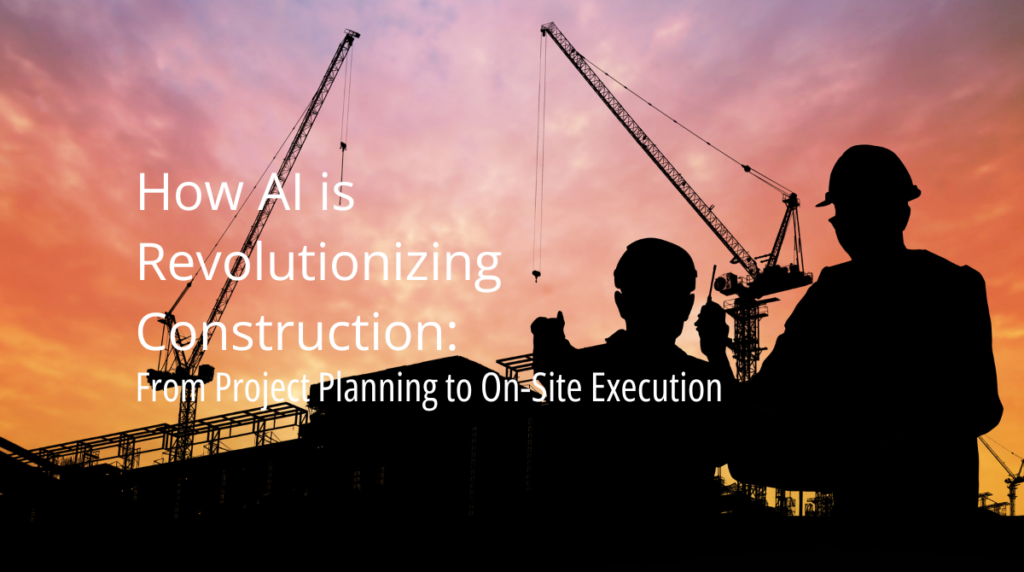
It’s no surprise the construction industry is undergoing a digital transformation with artificial intelligence (AI) being at the forefront. From streamlining project planning to optimizing job site operations, AI-driven technologies are reshaping how construction companies design, build, and maintain infrastructure.
Let’s explore the key ways AI is enhancing efficiency, reducing costs, and improving safety across the construction industry.
AI in Project Planning: Smarter, Faster, and More Accurate
Effective project planning is critical for construction success, and AI is taking it to a new level by improving accuracy, reducing risks, and optimizing schedules.
1. Predictive Analytics for Better Decision-Making
AI-powered predictive analytics can analyze historical project data, market conditions, and supply chain trends to forecast potential delays, budget overruns, or material shortages. This enables construction firms to make proactive decisions and mitigate risks before they escalate.
2. Automated Design Optimization
Generative design, powered by AI, allows engineers and architects to input project parameters—such as materials, budget, and environmental conditions—and let AI generate multiple design options. This results in cost-effective and structurally optimized blueprints.
3. AI-Driven Scheduling and Resource Allocation
AI algorithms can analyze workforce availability, weather patterns, and project deadlines to create optimized schedules. This helps reduce downtime, prevent scheduling conflicts, and ensure efficient use of labor and materials.
AI in On-Site Execution: Enhancing Efficiency and Safety
Once construction begins, AI continues to play a vital role in monitoring progress, improving productivity, and ensuring worker safety.
4. Robotics and Automation
AI-powered robots and autonomous machinery are revolutionizing construction sites by handling repetitive and labor-intensive tasks. For example: Brick-laying robots can construct walls faster and with greater precision than human workers.
AI-driven excavators and bulldozers can operate autonomously, reducing the need for manual labor and improving efficiency.
5. AI-Powered Drones for Site Monitoring
Drones equipped with AI-powered cameras can capture real-time site data, track construction progress, and detect potential safety hazards. These aerial insights help project managers identify and resolve issues faster, reducing costly delays.
6. Computer Vision for Safety Compliance
AI-driven computer vision systems can analyze job site footage to detect unsafe behavior, such as workers not wearing protective gear or entering restricted zones. By identifying risks in real time, these systems help prevent accidents and improve overall safety.
AI in Construction Management: Streamlining Operations
Beyond planning and execution, AI enhances overall construction management by improving communication, optimizing budgets, and automating administrative tasks.
7. AI-Enhanced Supply Chain and Inventory Management
AI-powered tools can predict material demand, optimize procurement processes, and prevent shortages or overstocking. This reduces waste, cuts costs, and ensures projects stay on schedule.
8. Chatbots and AI Assistants for Communication
AI-driven virtual assistants can streamline communication between stakeholders, answer common project-related questions, and automate administrative tasks like scheduling meetings or generating reports.
9. AI-Driven Quality Control and Defect Detection
Machine learning algorithms can analyze construction site images and detect defects in structures, ensuring quality standards are met before costly rework is required.
The Future of AI in Construction
As AI technology continues to advance, its role in construction will only expand. In the coming years, we can expect:
1. Greater adoption of digital twins to simulate and optimize construction projects.
2. More AI-powered robotics for automation of complex tasks.
3. Enhanced AI-driven safety systems to further reduce workplace accidents.
AI is not just a futuristic concept—it’s already transforming the construction industry today. By leveraging AI-powered solutions, construction firms can improve efficiency, reduce costs, and enhance safety on job sites.
Embracing AI-driven innovations will help companies stay competitive in an industry that’s rapidly evolving.
